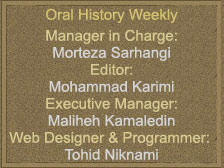| No. 223 | 11 October 2015 |
The Imposed War Oral HistoryNew Horizons or Multiple Narratives?The expanding trend in using Oral History, bring about this question: What kind of goals and conclusions does Oral History observe? This question is based on two presumptions: First, using Oral History is followed for completing written history with a cultural-social approach. Moreover, the outcome of imposed war oral history would develop people’s defense approach toward war based on cultural-ideological teachings, and also multiple narratives of war events by the cooperation of all the people who have experienced war.Oral history of Islamic Revolution in Bushehr (2)Campaign centersIn the following article, we will review the process of campaigns against the Pahlavi regime as well as the current of the Islamic revolution in Bushehr Province and in particular, the city of Bushehr. It also reviews the Islamic movement of the people of Bushehr in following the leader of the revolution Imam Khomeini (God bless his soul). Another goal of the following writing is to introduce the clergies and campaigners of Bushehr. Interviews have been conducted for collection of information.Oral History of Sports in Mashhad:First Athletics Gold Medalist in Khorasan ProvinceOral history makes possible the review of memories and experiences of the first athletes from Khorasan Province who stepped in national and international athletic events and won medals for their city and country. The following are accounts of the first national gold medalist of Khorasan Province.Iran-Iraq War andMoney in FrontsA question has always been in my mind that if it is possible to deal with subjects that are not so much dealt with and even might be considered somehow critical. It seems that the film “Deportees (Ekhraji-ha)” and publication of some notes about the Sacred Defense (Iran-Iraq War) made this atmosphere more debatable. The subject “Money in War” was made more attractive to me when I heard from some of veterans that they went to the fronts with no money on with them and returned as they went (with no money). It means they didn’t need money when they were in the fronts. The same seems so impossible for us in 2015. Oral History Weekly Magazine Aims and Regulations
Oral History Weekly Magazine wishes to create a suitable place for thoughts and idea development; Its main field would be “Oral History” and subjects as telling & writing memoirs, writing diaries, travelogues, chronologies, and all other subfields of history which are presented in the form of news, articles, reports, notes, interviews and memoirs can be included. There is no limitation on the length of would-be-sent materials. Mentioning the name, academic background and email is necessary. Articles with complete references and bibliography are more credited and an abstract would quite helpful. Weekly is not about to publish any material consisting insults and libels about other people or anything that brings anxiety to public opinion. Weekly can edit and translate the received materials. The published articles and materials are only the writer’s ideas and Oral History Weekly Magazine has no responsibility about their content. |
 Daughter of Sheena-52 Memories of Qadamkheyr Mohammadi Kanaan Wife of Sardar Shaheed Haj Sattar Ebrahimi Hajir Memory writer: Behnaz Zarrabizadeh Tehran, Sooreh Mehr Publications Company, 2011 (Persian Version) Translated by Zahra Hosseinian It happened as what Samad had said; pilgrimage changed my mood completely. In themornings I would go to the shrine, pray the ones which were not said at the proper time, and I was engaged in prayer and pilgrimage. Sometimes, we would regret halfway, when leaving the shrine and getting back to the hotel. We could not bring ourselves to leave there, so we would return to the shrine again. One day, as I had sat there and let my eyes rest on the shrine, suddenly noticed a crowd entered the shrine who shouted la ilaha illa'llah. They were slowly carrying several coffins and sprinkling rose-water and throwing flowers toward the coffins. I found out they were martyrs of Mashhad whose funeral were supposed to be hold that day, when I asked around. I do not know how I remembered Samad and were close to tears. I asked my mother-in-law to take after my babies and then joined to the crowd carrying the coffins.    |
